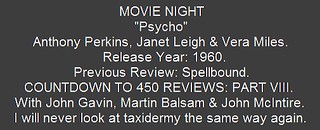 Review #1409: The Man Who Shot Liberty Valance.
Review #1409: The Man Who Shot Liberty Valance.Cast:
John Wayne (Tom Doniphon), James Stewart (Ransom "Ranse" Stoddard), Vera Miles (Hallie Stoddard), Lee Marvin (Liberty Valance), Edmond O'Brien (Dutton Peabody), Andy Devine (Marshal Link Appleyard), Ken Murray (Doc Willoughby), John Carradine (Maj. Cassius Starbuckle), Jeanette Nolan (Nora Ericson), John Qualen (Peter Ericson), Willis Bouchey (Jason Tully), Carleton Young (Maxwell Scott), Woody Strode (Pompey), Denver Pyle (Amos Carruthers), Strother Martin (Floyd), and Lee Van Cleef (Reese) Directed by John Ford (#398 - The Last Hurrah, #1324 - 3 Bad Men, #1349 - Stagecoach, #1372 - Fort Apache, and #1392 - The Searchers)
Review:
"This is the West, sir. When the legend becomes fact, print the legend."
The ravages of time strikes all of us in the end. What is destiny and history but in the eye of the one telling it? This can apply as a philosophical question but also to film as well, particularly with John Ford and this particular film. The 1960s was the sixth and final decade in which Ford directed a film, having won four Best Director Academy Awards and two more for his war documentaries in the years before. It was not the last Western that he would direct (that went to his penultimate film Cheyenne Autumn, released two years later), nor was it his last feature (he directed four more films after this one, the last being 7 Women in 1966), but this film is generally regarded as the last great film of Ford's lengthy career, with Sergio Leone describing it was the only film that Ford "learned about something called pessimism." By this time in his career, Ford found it harder to fund his features, with this taking months for Paramount Pictures to greenlight the feature, and he found some resentment in having Wayne forced onto him as star, although said resentment could also be due to being shuttled off to second unit work not meant to be used on John Wayne's The Alamo (1960). This also happened to be Ford's last black-and-white film, and the decision to shoot it in this process was evidently his decision alone and not a matter of budget. Ford is on record for stating his preference for black-and-white photography over color, calling it "real photography" that requires one to be careful and know where to lay the shadows and make the right perspective. It just happens that it also helps in suspending disbelief (at least most of it) in the idea of 50-year old Wayne and Miles portraying characters significantly younger for a majority of the film, which would be filmed mostly on the lot as opposed to Monument Valley.
The film was adapted by writers James Warner Bellah and Willis Goldbeck from a 1953 short story by Dorothy M. Johnson. At any rate, this is an involving and successful look upon its ironic tale of a hero and his destiny, a thoughtful Western that utilizes its familiar company of actors and crew for Ford to tremendous effect. It moves at its own pace and structure at 123 minutes that is filled with more grit and realism than Ford's previous output, where the myth can prove to endure far more than the facts themselves, for better or worse. Stewart, as one would expect from such an distinct everyman like him, does tremendously well in carrying his composure and idealism in the face of danger and destiny, whether that means interacting with the townsfolk about statehood or having to use a gun to save himself. In that sense, Wayne fits like a glove on the other side of the main coin, significantly grittier in presence but still having plenty of rough conviction to make this compelling, despite his troubles with this film. He felt that this was a tough role for him, seeming merely functional to the plot to have to make a part out of (while opposing the idea that it was one with ambiguity, since he hated and distrusted ambiguity), and Ford's heaping of abuse (ranging from his failures to make it as a football player to his lack of war service) did not help. Miles accompanies the last angle of the film's careful love triangle with subtlety and care. Marvin, known for his supporting and villainous roles, excels in a title role with plenty of viciousness and grime to go around in each scene he is in, such as the delegate scene or the showdown near its end. O'Brien proves just as adept in inspiring curiosity as a presence and voice for a town, while Devine inspires a few chuckles as said town's supposed authority. Others don't have as much time on screen, but they do make it count, such as Carradine and his grand-old bluster present in the last twenty minutes or a composed Strode. One is invested in this tale that is being told through flashback without growing tired of its capturing of what made the Old West: a tall tale with honesty, amusement and a conclusion worth writing home about, where men can be made or broken on the strength of a lie (or in this case, a myth). In any case, this is an entertaining and thoughtful Western from John Ford as one would expect from such a distinguished filmmaker who honed his craft in delivering entertainment over the course of six decades that has something for everyone now more than ever.
Overall, I give it 9 out of 10 stars.

 Review #1392: The Searchers.
Review #1392: The Searchers.